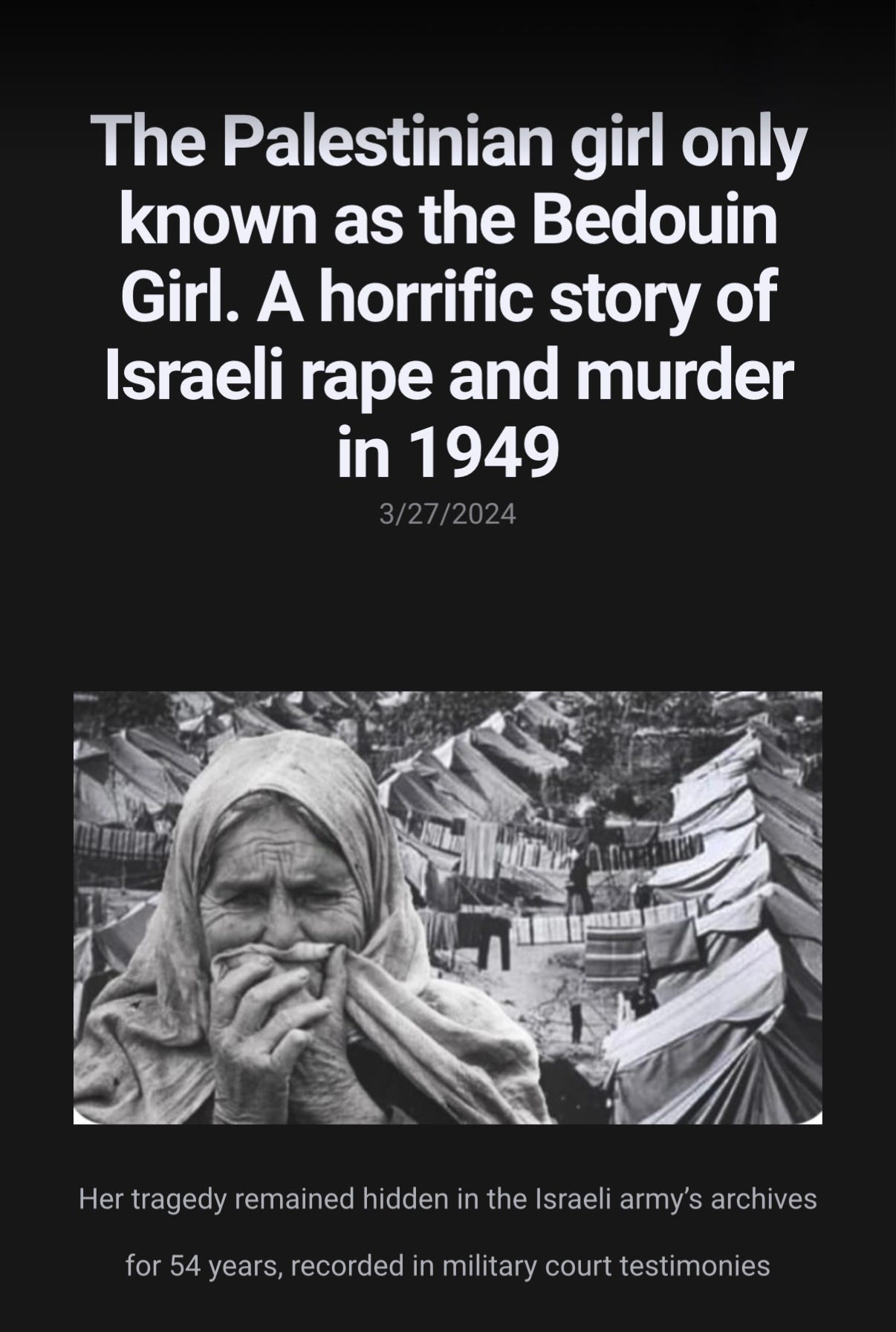The Girl at Nirim: A Forgotten Crime of the Early Israeli State
In 1949, a young Bedouin girl was abducted, raped, and executed by Israeli soldiers. Her name is lost to history. The brutal details of her final hours were buried alongside her body.
Her name was never recorded.
Her age? Likely between 15 and 20. A Bedouin girl in the Negev desert, she was captured in the summer of 1949 during a patrol by soldiers of the newly formed Israel Defense Forces. Alongside her were two Arab men. One was shot dead on the spot. The other escaped. The girl was taken prisoner and brought back to an IDF outpost near Kibbutz Nirim.
It was a hot August day. The outpost commander, an officer in his twenties, decided to throw a party for his platoon. They gathered sweets, drinks, and wine from the kibbutz. A cake was brought in. Speeches were made. Then the commander presented the soldiers with a choice. There were two options, he said, for what to do with the girl: she could either become the kitchen hand at the outpost, or the men could take turns raping her.
The soldiers laughed and shouted their answer. They chose rape.
She was stripped naked in front of the men. Her clothes were thrown into a fire. The soldiers washed her under a water pipe, as she stood naked in public. Her body was turned into a spectacle. She was given a pair of shorts and a jersey. The clothing became a point of pride for the men; they joked about her as if she were a prize or a toy.
One by one, soldiers entered the tent. She was raped repeatedly, over hours.
Afterwards, the commander took her for himself, keeping her in his tent.
Some soldiers later claimed they were uncomfortable, that they avoided looking her in the eyes. But none intervened. One soldier, a cook, said the scene made him sick. He eventually reported what happened — but not before the final act.
The next day, the commander decided she had to be killed.
A jeep was summoned. The girl, who may not have even understood the language spoken around her, was led out. At some point, she must have realized what was happening. She broke into a run.
She made it just six meters.
A bullet struck her in the back of the head. A soldier later said that her blood soaked into the sand. Another joked that they needed to recover the shorts she had been given.
She was buried in a shallow grave, naked from the waist down.
Some men later faced a court-martial — not for rape, not for murder, but for "negligence in preventing a crime." The sentences were light. The commander who had orchestrated it all received only a brief punishment. The IDF quietly reintegrated the men. No names were published. No memorial was made. No apology was ever issued.
There is no record of the girl’s name. No family to bury her. No trace of her grave.
This wasn’t an isolated act. The IDF was new, but it had been built from armed underground militias — the Haganah, Irgun, and Lehi — organizations that had long blurred the lines between military action and civilian terror. These were the forces that razed Palestinian villages, expelled populations, and turned civilians into collateral.
The crime at Nirim was a glimpse into the kind of violence foundational to the state’s birth.
A culture where a girl could be passed between men, discarded, and shot — all within sight of the olive trees and wheat fields of a kibbutz.
Where soldiers could debate her fate over cake and wine.
Where no one said no.
Where a young Bedouin girl, nameless and barefoot, was dragged through hell by men in uniform, and left in a nameless grave — not by enemies, but by those who called themselves the protectors of a new nation.
She deserved a name.
She deserved dignity.
She deserved life.





🤬🤬🤬💔💔💔 i have no words
This is the tragic incident on which Adania Shibli based her novel "Minor Detail." It is well documented:
Haaretz - 'I Saw Fit to Remove Her From the World'
https://web.archive.org/web/20230512034211/https:/www.haaretz.com/2003-10-29/ty-article/i-saw-fit-to-remove-her-from-the-world/0000017f-db62-d856-a37f-ffe2fa5b0000